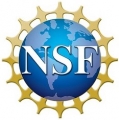-
Xingshan Cui, Purdue University
-
Paul Martin , University of Leeds
-
Eric Rowell, Texas A&M University
-
Zhenghan Wang , University of California, Santa Barbara and Microsoft Research
About:
Topology is likely to be featured prominently in any truly useful quantum computation scheme. The hurdle of scalable fault-tolerance is insurmountable with the current incremental progress -- while it is possible to engineer systems supporting hundreds of physical qubits, applications beyond academic interest require millions of qubits to implement robust error correction. Topological quantum computation (TQC) relies upon the preparation of topological phases of matter supporting non-abelian anyons to perform inherently fault-tolerant operations. As errors are corrected at the hardware level through the topological nature of anyons, the problem of scalability is simultaneously overcome. On the other hand, despite years of effort we still don't have unassailable confirmation that non-abelian anyons exist.
This workshop brought together researchers in a diversity of fields in and around TQC for the purpose of broadening and deepening the subject, with an eye towards accelerating the realization of scalable technology. We explored new directions beyond the traditional anyon community, embracing relevant topics such as quantum cellular automata, fractons, categorical symmetries and motion groups in 3-dimensions.
Participants were a mixture of world experts and early career researchers from several fields in mathematics and physics from across the globe.
Programme:
| Monday 9 October 2023 | ||
| Arrival and registration | ||
| Welcome | ||
| Maissam Barkeshli, University of Maryland | Higher group symmetry in topological states | |
| Tea & coffee | ||
| Steven Simon, University of Oxford | Experiments with Anyons | |
| Lunch | ||
| Nathanan Tantivasadakarn , California Institute of Technology | From wave-function collapse and Galois solvability to the realization of non-Abelian topological order on a quantum device | |
| Tea & coffee | ||
| Margarita Davydova, Massachusetts Institute of Technology | Quantum computation from dynamic automorphism codes | |
| Welcome reception at ICMS | ||
| Tuesday 10 October 2023 | ||
| Arthur Jaffe, Harvard University | Fourier Analysis in Discrete Quantum Theory | |
| Tea & coffee | ||
| Corey Jones, North Carolina State University | Quantum cellular automata on fusion categorical spin chains | |
| Lunch | ||
| Fiona Torzewska, University of Bristol | Motion Groupoids | |
| Tea & coffee | ||
| Yasuyuki Kawahigashi, University of Tokyo | Two-dimensional topological order and operator algebras | |
| Wednesday 11 October 2023 | ||
| Colleen Delaney, UC Berkeley | Zesting anyons and symmetry defects | |
| Tea & coffee | ||
| Hubert Saleur, IPhT CEA Saclay | Topological lines and RG flows in loop models | |
| Lunch and free afternoon | ||
| Thursday 12 October 2023 | ||
| David Penneys, Ohio State University | Boundary algebras and local topological order | |
| Tea & coffee | ||
| Yoshiko Ogata, University of Tokyo | Boundary states of a bulk gapped ground state in 2-d quantum spin systems | |
| Lunch | ||
| Eric Samperton, Purdue University | Topological quantum computation is hyperbolic | |
| Tea & coffee | ||
| Vanessa Miemietz, University of East Anglia | Higher representation theory | |
| Workshop dinner | ||
| Friday 13 October 2023 | ||
| Catherine Meusburger, Friedrich-Alexander Universität Erlangen-Nürnberg | Turaev-Viro state sum models with defects | |
| Tea & coffee | ||
| Paul Fendley, University of Oxford | “Dualities” from non-invertible topological defects | |
| Lunch and end of workshop |

